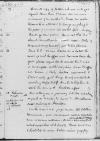Letter #30
Ioannes DANTISCUS to Alfonso de VALDÉS[Mantua or Augsburg], [shortly before 1530-04-18 or shortly before 1530-11-22]
English register:
Dantiscus asks not to be blamed for Lewicki’s inappropriate actions.
Manuscript sources:
Prints:
| ||||||||
Text & apparatus & commentary Plain text Text & commentary Text & apparatus
Res cum

 CBKUL, R.III, 31, No. 302, 21
CBKUL, R.III, 31, No. 302, 21